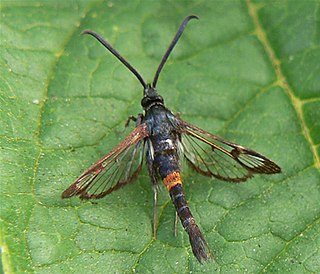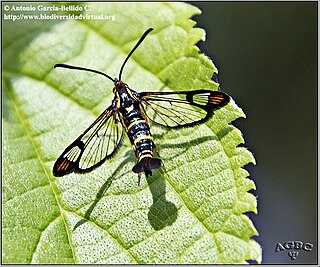
Synanthedon culiciformis, known as the large red-belted clearwing, is a moth of the family Sesiidae. It is found in the Palearctic and Nearctic realms.

Synanthedon myopaeformis is a moth of the family Sesiidae and the order Lepidoptera. In Europe it is known as the red-belted clearwing and in North America as the apple clearwing moth. The larvae create galleries under the bark of fruit trees, especially old trees with damaged trunks. During this process, the larvae cause significant damage to host trees. Particular attention has been paid to the damage they cause to apple trees. Their status as a pest of apple orchards has led to many research projects aimed at controlling populations of the moth. This moth is native to Europe, the Near East and North Africa. Recently, the moth was introduced into North America, being first detected in Canada in 2005. There are several organisms that threaten the larvae, including parasitoids, nematodes, and bacteria.

Synanthedon spheciformis, the white-barred clearwing, is a moth of the family Sesiidae. It is found in Europe and Siberia.

Synanthedon tipuliformis, known as the currant clearwing, is a moth of the family Sesiidae. It is endemic to the Palearctic realm, but is an invasive species in the Nearctic realm and the Australasian realm.

Synanthedon is a genus of moths in the family Sesiidae.

Synanthedon andrenaeformis, the orange-tailed clearwing, is a moth of the family Sesiidae. It is known from most of Europe. It is also present in the Near East.
Synanthedon squamata is a moth of the family Sesiidae. It is known from Malawi.
Synanthedon beutenmuelleri is a moth of the family Sesiidae. It is known from the Republic of the Congo.
Synanthedon gabuna is a moth of the family Sesiidae. It is known from Gabon.
Synanthedon guineabia is a moth of the family Sesiidae. It is known from Equatorial Guinea.
Synanthedon nuba is a moth of the family Sesiidae. It is known from the Republic of the Congo and Gabon.
Synanthedon pauper is a moth of the family Sesiidae. It is known from Cameroon.

Synanthedon formicaeformis, the red-tipped clearwing, is a moth of the family Sesiidae and can be found in all of Europe, the eastern Palearctic realm, and the Near East. The larvae sometimes form pear-shaped galls on willows. It was first described by Eugenius Johann Christoph Esper in 1783.

Synanthedon stomoxiformis is a moth of the family Sesiidae. It is found in most of Europe and the Middle East.

Synanthedon conopiformis, Dale's oak clearwing, is a moth of the family Sesiidae. It is found in almost all of Europe, except the north.
Synanthedon flaviventris, the sallow clearwing, is a moth of the family Sesiidae. The larvae form pear-shaped galls on sallows.

Synanthedon scoliaeformis, the Welsh clearwing, is a moth of the family Sesiidae. It is found from almost all of Europe, east through Russia to Japan.

Synanthedon sapygaeformis, the Florida oakgall moth, is a species of clearwing moth in the family Sesiidae.










